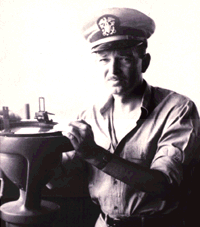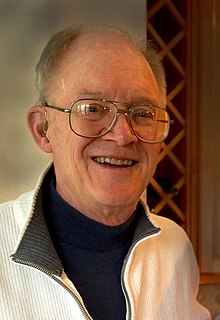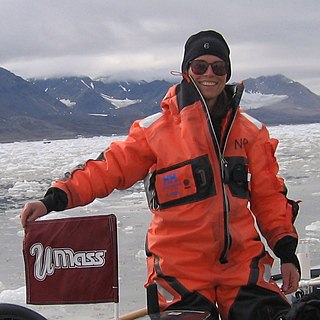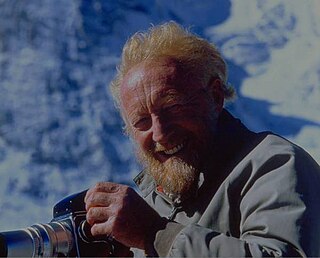Related Research Articles

William Maurice "Doc" Ewing was an American geophysicist and oceanographer.

Harry Hammond Hess was an American geologist and a United States Navy officer in World War II who is considered one of the "founding fathers" of the unifying theory of plate tectonics. He is best known for his theories on sea floor spreading, specifically work on relationships between island arcs, seafloor gravity anomalies, and serpentinized peridotite, suggesting that the convection of the Earth's mantle was the driving force behind this process.
Dr. Walter Hermann Bucher was a German-American geologist and paleontologist.
Sir Nicholas John Shackleton was an English geologist and paleoclimatologist who specialised in the Quaternary Period. He was the son of the distinguished field geologist Robert Millner Shackleton and great-nephew of the explorer Ernest Shackleton.
Raymond S. Bradley is a climatologist and University Distinguished Professor in the Department of Geosciences at the University of Massachusetts Amherst, where he is also research director of the Climate System Research Center. Bradley's work indicates that the warming of Earth's climate system in the twentieth century is inexplicable via natural mechanisms.

Luna Bergere Leopold was a leading U.S. geomorphologist and hydrologist, and son of Aldo Leopold. He received a B.S. in civil engineering from the University of Wisconsin in 1936; an M.S. in physics-meteorology from the University of California, Los Angeles in 1944; and a Ph.D. in geology from Harvard University in 1950.
William Richard Peltier, Ph.D., D.Sc. (hc), is University Professor of Physics at the University of Toronto. He is director of the Centre for Global Change Science, past principal investigator of the Polar Climate Stability Network, and the Scientific Director of Canada's largest supercomputer centre, SciNet. He is a fellow of the Royal Society of Canada, of the American Geophysical Union, of the American Meteorological Society, and of the Norwegian Academy of Science and Letters..
Mark F. Meier was an American glaciologist who was considered a leading expert on the study of rising sea levels due to the melting of glaciers. Meier was the Director of the Institute of Arctic and Alpine Research (INSTAAR) from 1985 to 1994 and remained the institute's director emeritus until his death in 2012. He was also a professor of geological sciences at the University of Colorado Boulder.
Ellen Mosley-Thompson is a glaciologist and climatologist. She is a Distinguished University Professor at The Ohio State University (OSU) and Director of the Byrd Polar and Climate Research Center at OSU. She is known as a pioneer in the use of ice cores from the Polar Regions for paleoclimatic research and is an influential figure in climate science. She is an elected fellow of the American Association for the Advancement of Science, the American Geophysical Union and an elected member of the National Academy of Sciences.

The Institute of Arctic and Alpine Research (INSTAAR) is a scientific institute that is part of the University of Colorado Boulder. Its research mission is to "[develop] scientific knowledge of physical and biogeochemical environmental processes at local, regional and global scales, and appl[y] this knowledge to improve society's awareness and understanding of natural and anthropogenic environmental change."
Anne Hope Jahren is an American geochemist and geobiologist at the University of Oslo in Norway, known for her work using stable isotope analysis to analyze fossil forests dating to the Eocene. She has won many prestigious awards in the field, including the James B. Macelwane Medal of the American Geophysical Union.

Diane McKnight is a professor of civil, environmental, and architectural engineering at the University of Colorado Boulder and a fellow at the Institute of Arctic and Alpine Research (INSTAAR). McKnight is a founding principal investigator of the National Science Foundation's Long-Term Ecological Research (LTER) program in the McMurdo Dry Valleys of Antarctica.

John T. "Jack" Gosling was an American physicist, whose research in heliophysics focused on the large-scale structure and magnetic topology of the solar wind, coronal mass ejections, solar wind and geomagnetic disturbances, magnetic reconnection, collisionless shocks, and particle acceleration in space. Gosling most recently performed research at University of Colorado and was an Elected Fellow of the American Association for the Advancement of Science.

James Zachos is an American paleoclimatologist, oceanographer, and marine scientist. He is currently a professor and chair of the Department of Earth and Planetary sciences at University of California, Santa Cruz where he was elected to the National Academy of Sciences in 2017. He has conducted research on a wide variety of topics related to biological, chemical, and climatic evolution of late Cretaceous and Cenozoic oceans, and he is recognized for transforming our understanding of long-term climate change and climate transitions in the past 65 million years. His investigations of past climatic conditions are intended to improve our ability to understand the consequences of anthropogenic carbon emissions on future climate change.
Robert Stewart Anderson is an American geomorphologist at the Institute of Arctic and Alpine Research.
Richard Hugh Sibson is a New Zealand structural geologist and emeritus professor at the University of Otago, who has received numerous honors and awards for his work in the field of earthquake research. He has caused a 'fundamental shift' in the interpretation of the relationship between earthquakes and fault zone geology and on the origin of fault-hosted mineral deposits.

Julie Brigham-Grette is a glacial geologist and a professor in the Department of Geosciences at the University of Massachusetts Amherst where she co-directs the Joseph Hartshorn Quaternary Laboratory. Her research expertise is in glacial geology and paleoclimatology; she has made important contributions to Arctic marine and terrestrial paleoclimate records of late Cenozoic to recent, the evolution of the Arctic climate, especially in the Beringia/Bering Strait region, and was a leader of the international Lake El’gygytgyn Drilling Project in northeastern Russia.
Stephen Cummings Porter was an American geologist who taught in the department of Geological Sciences and directed the Quaternary Research Center at the University of Washington. He was chief editor of the journal Quaternary Research from 1976 until his retirement in 2001. He died in 2015 at the age of 80.

Jack D. Ives is a Canadian montologist, an Honorary Adjunct Research Professor of Geography and Environmental Studies at Carleton University in Ottawa, Ontario, Canada, an author, and a prominent advocate of mountain issues at the global level. He was formerly director of the Institute of Arctic and Alpine Research at the University of Colorado, Boulder, founding editor of two peer-reviewed journals, chair of the Commission on High Altitude Geoecology under the auspices of the International Geographical Union, and a senior advisor on mountain ecology and sustainable development for United Nations University.
Merritt Turetsky is American ecosystem ecologist who is a professor at the University of Colorado Boulder. She serves as Director of the Institute for Arctic and Alpine Research (INSTAAR). Her research considers fire regimes, climate change and biogeochemical cycling in Arctic wetlands. Turetsky is a member of the Permafrost Action Team (SEARCH), a group of scientists who translate and deliver science to decision-makers.
References
- ↑ John T. Andrews page, Institute of Arctic and Alpine Research. Retrieved 27 July 2018.
- ↑ "Anderson, Andrews elected fellows of the American Geophysical Union". University of Colorado Boulder. February 16, 2006. Retrieved November 25, 2018.
- ↑ "AAAS Members Elected as Fellows", American Association for the Advancement of Science, 6 December 2011 Retrieved 27 July 2018.
- ↑ "Geological Society of America awards John Andrews the Penrose Medal", Institute of Arctic and Alpine Research, 9 August 2016. Retrieved 27 July 2018.
- https://www.geosociety.org/news/pr/2016/16-40.htm Archived 2016-08-21 at the Wayback Machine